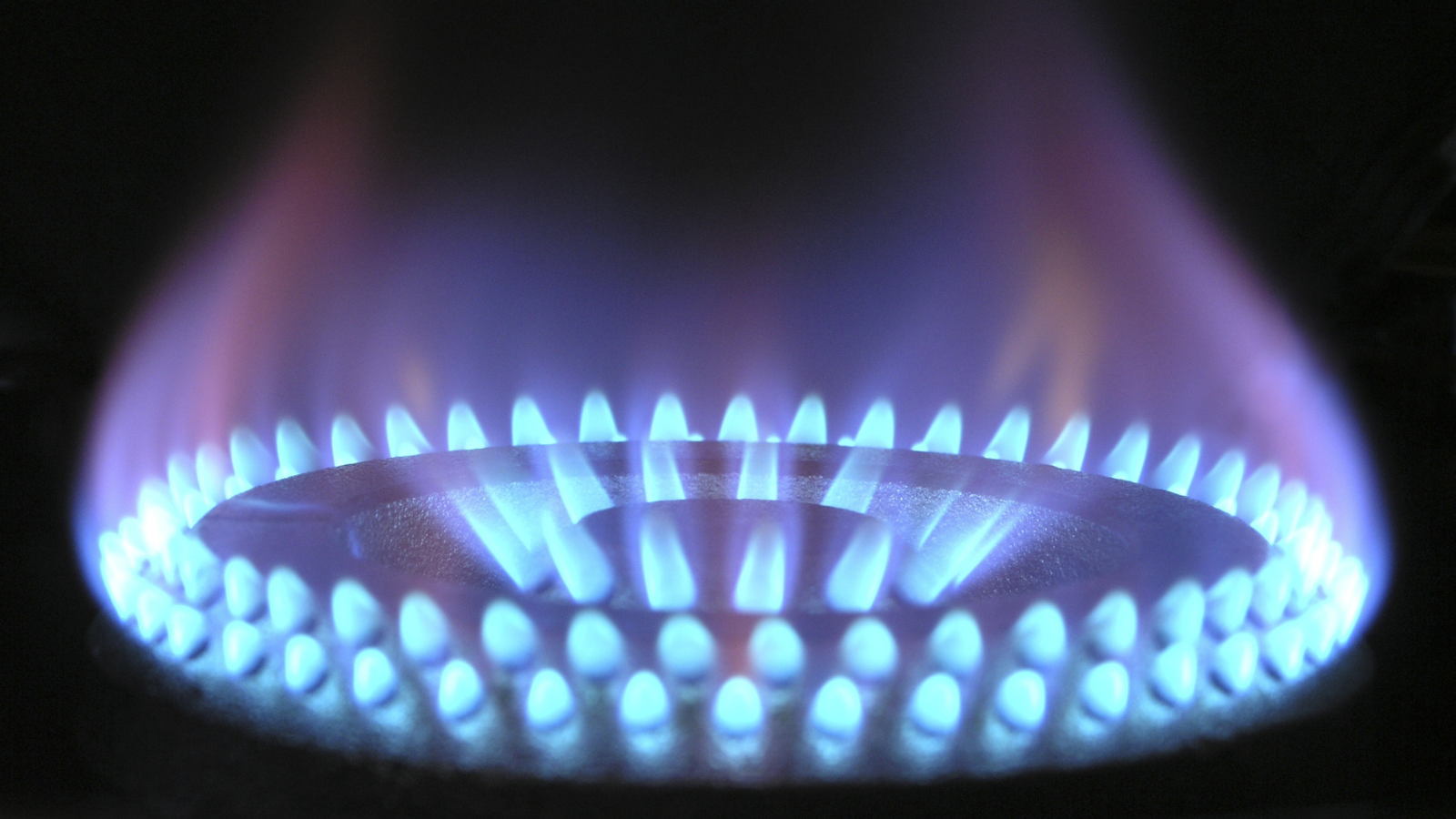
Ten Ways Methane Gas Companies Are Misleading the Public
Methane gas is a fossil fuel that pollutes our air and poses risks to public health. But you wouldn’t know it from the way the gas industry portrays it.

Written by Environment America clean energy intern Emily McCabe
Methane gas is a fossil fuel that pollutes our air and poses risks to public health. But you wouldn’t know it from the way the gas industry portrays it.
What most people call “natural” gas is actually primarily made up of methane, a short-lived but super-potent greenhouse gas. Over the first 20 years after it’s released into the atmosphere, methane causes 80 times the climate-warming harm of carbon dioxide.
When natural gas is extracted from the ground and transported through pipelines , it releases climate-heating methane into the air. Then, when it is burned, natural gas releases even more global warming pollution into our air in the form of carbon dioxide.
Methane is responsible for nearly half of global warming to date. Not only does methane gas use threaten to destabilize our planet’s climate system, but burning gas in the home can also be damaging to our health. Cooking with gas, for example, can produce air pollution levels indoors that would exceed outdoor standards.
Sadly, most Americans are not fully aware of the dangers associated with burning methane gas to heat our homes and cook our food. One of the reasons for that is that utility companies have greenwashed natural gas to make it appear safer and cleaner than it really is. Here are ten examples of how gas companies use misleading language to advertise gas to consumers.
-
‘Clean’ gas
Some utilities tell their customers that gas is a ‘clean’ fuel. They claim this because burning gas is cleaner when compared to burning coal. This reasoning fails to account for all the ways that gas pollutes at every stage of its life cycle. When it comes to global warming, methane pipeline leaks mean that gas can have a similar climate impact compared to coal over the short term. A new study from the Harvard T. Chan School of Public Health, found that the gas we burn in our homes contains many health-damaging air pollutants, and the impacts that fracking for gas has had on our nation’s waterways and natural landscapes is anything but clean.
Gas companies like Philadelphia Gas Works in Pennsylvania describe gas as the “most sustainable energy choice” because it’s the “cleanest” fossil fuel. A truly clean source of energy is one that doesn’t pollute our air at all. Gas companies like this one ignore truly clean energy options like solar, wind and geothermal power.
-
‘Safe’ gas
Utilities work hard to disguise the dangers of gas. For example, Xcel Energy in Colorado describes gas as a “safe” form of energy, when in reality gas is prone to disaster. Methane gas is highly explosive, putting communities at risk. Unfortunately, gas leaks and pipeline incidents occur more often than you’d think, leading to death and injury. In fact, we know that 2,595 gas pipeline incidents occurred from 2010 to 2021 – and those are just the leaks that were reported to the federal government. The total number is much higher. Reliance on gas puts public health and safety at risk, but Xcel would lead you to believe otherwise.
-
‘Renewable’ gas
“Renewable natural gas” (RNG) is what the industry calls biomethane, a climate-warming pollutant. RNG is created by capturing waste methane from landfills, manure and sewage. While that means it does reduce emissions compared to traditional methane gas, when it’s burned, biomethane still emits carbon dioxide into the atmosphere, just like regular gas. And there isn’t even close to enough of it to keep up with our current demand for methane. Still, companies like Nicor Gas in Illinois say that “renewable natural gas” is an option that benefits the environment. The sun that powers our solar panels and the wind that turns turbines are abundant truly renewable resources.
-
‘Net-zero’ gas
To reach net-zero greenhouse gas emissions, we must stop using fossil fuels for energy. Atmos Energy in Texas, for example, touts their ability to build “zero net energy” homes as “a part of the solution to achieve our low carbon energy future.” Directly burning gas in buildings and other fossil fuels in the home is a leading source of greenhouse gas emissions. To actually get to a net-zero emission home would require installation of electric technologies, powered by renewable energy. A true clean energy home would use a mix of electric space and water heating and electric appliances powered by the sun and wind, resulting in zero emissions.
-
‘Non-toxic’ gas
A New Jersey gas company, PSEG claims that if natural gas is inhaled in small amounts, it is not harmful or poisonous to humans. But even if it’s true that it isn’t harmful in small amounts, that’s not how this plays out in real life, because cooking with gas without ventilation can produce air pollution levels indoors that would exceed outdoor standards. That means that doing something as simple and innocuous as making a meal can release pollutants into our homes that some studies show lead to the development of asthma, especially in children, and may worsen symptoms for those with preexisting respiratory illnesses. One report compared the effects of using an unvented gas stove around kids to those of second-hand smoke exposure.
-
‘Organic’ gas sources
Gas companies often use misleading language to disguise the harm that their products do to the environment. Utilities like PG&E in California describe their biomethane as a fuel that comes from “non-hazardous” and “organic” sources. These words have positive connotations with consumers that may cause them to overlook the damage that biomethane combustion causes. The use of this language masks the fact that biomethane is still methane, which leaks often and releases carbon dioxide into the atmosphere during combustion and warms our planet. Using words that deceive customers about supposed environmental benefits is called greenwashing – and PG&E is guilty of it.
-
Using gas to meet our climate goals
In the United States, President Joe Biden has set a goal of 100% carbon pollution-free electricity by 2030. Many other states and localities have committed to 100% renewable energy. Gas companies like Washington Gas, which serves Washington, D.C., and the state of Maryland, claim “natural gas is a foundational fuel that can help us achieve our climate goals.” This contradicts a new study from Princeton University that found that for the U.S. to reach net zero emissions by 2050 (which is necessary to prevent the worst effects of climate change), methane gas production would need to decline by up to 90%. Methane gas cannot continue to be a “foundational fuel” if we need to reduce production to that extent, and instead we need to focus on powering our homes and buildings with clean electricity.
-
More efficient than electrification
Advances in electric technologies have made them much more efficient than their fossil fuel counterparts. Electric technologies like heat pumps, heat pump water heaters and induction stoves are efficient options to replace fossil fuel powered appliances in the home. Yet the Texas Gas Service website claims that gas excels at efficiency. In reality, electric technologies powered by the sun and wind can be much more efficient than those using natural gas. For example, an electric heat pump produces 3-6 times as much heat per unit of energy as a gas furnace. A sustainable future lies in electricity from renewable energy sources, not fossil fuels.
-
Methane gas vehicles as clean transportation
Gas companies would like you to believe that transportation requires burning fossil fuels. In Maryland, Washington Gas markets compressed natural gas as a clean alternative to gasoline and diesel, claiming the emissions “dissipate seamlessly into the air”. But compressed natural gas vehicles still emit climate pollution that warms our planet. The company fails to mention even cleaner transportation options – such as electric vehicles. Cars that run on electricity have zero tailpipe emissions, making them essential to reducing emissions in the transportation sector.
-
Gas propaganda in children’s coloring books
Perhaps the most insidious marketing strategy that gas companies use is directed at children. NW Natural in Portland, Oregon, sends free activity booklets to schools that praise the benefits of natural gas. Within these books, the company refers to natural gas as a “clean” transportation fuel. What the book doesn’t mention is that cleaner forms of transportation exist – for example, electric buses that do not emit harmful emissions. Gas companies know that children are the next generation of consumers, and are trying to influence how kids perceive gas through childhood education. NW Natural is not alone. Evrersource in Massachusetts has provided similar books to schools, and Xcel in Colorado has similar downloadable classroom materials.
Americans are increasingly concerned about climate change and they deserve the facts about the impacts of gas when they are making their energy choices. It’s time gas companies stopped greenwashing methane gas.
Image: Burning Stove, pexels.com (CCO)
Topics
Find Out More


Bank of America said it would stop financing drilling in the Arctic Refuge. Now it’s backtracking.

Methane emissions are accelerating climate change — here’s what we can do about it



